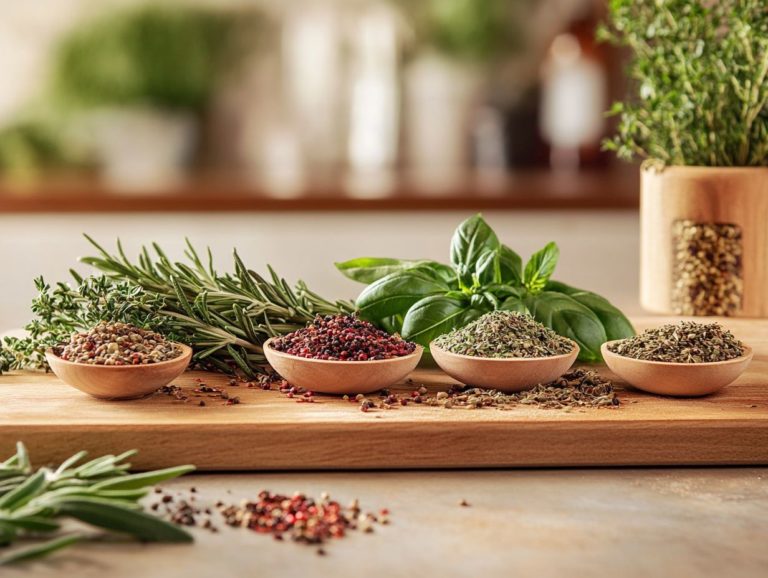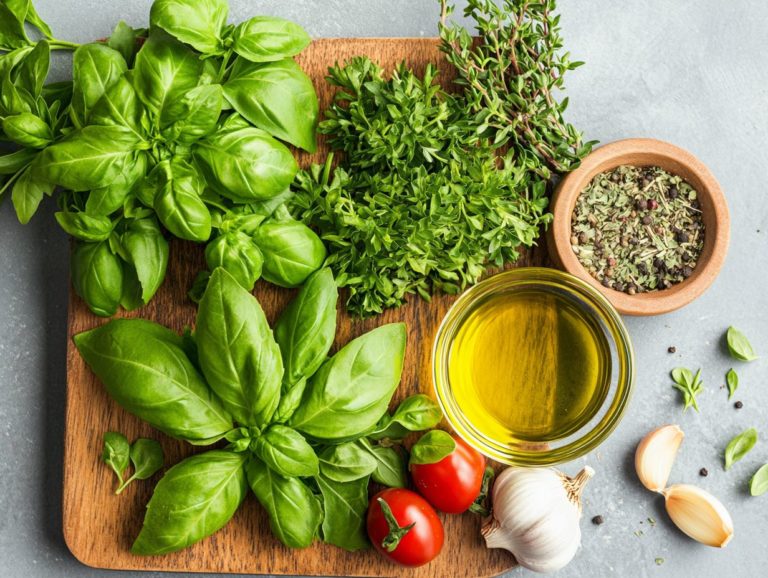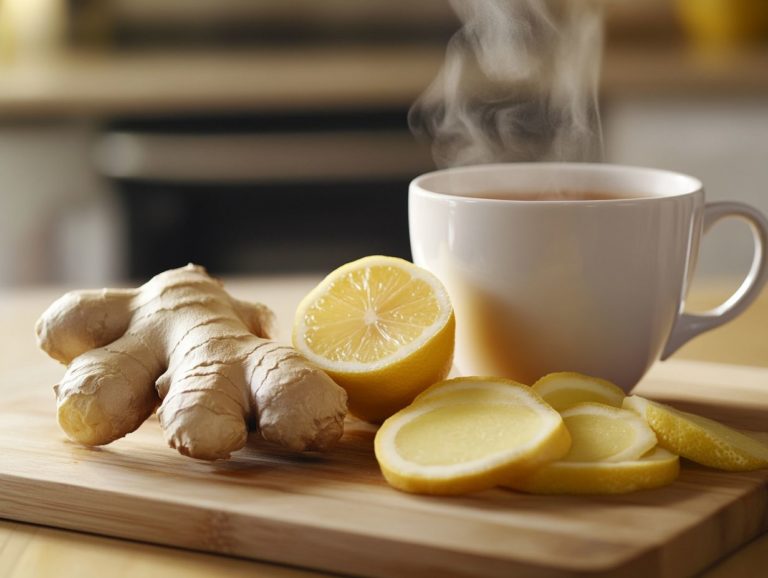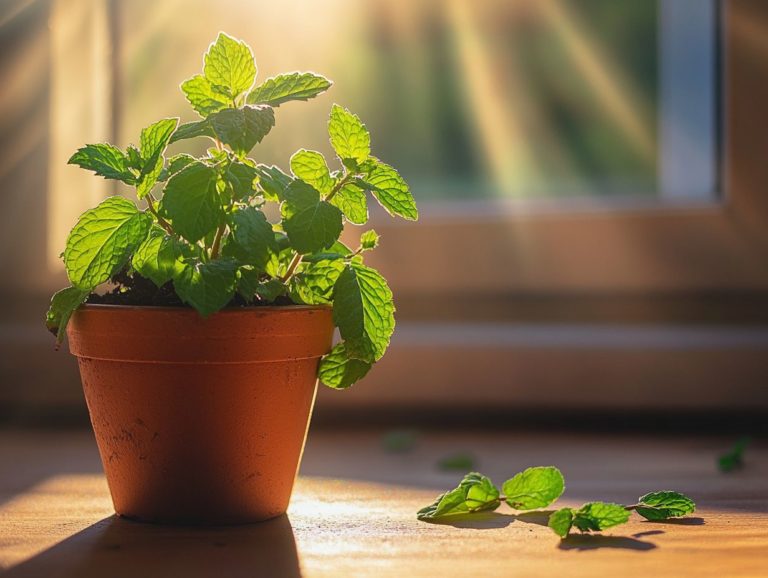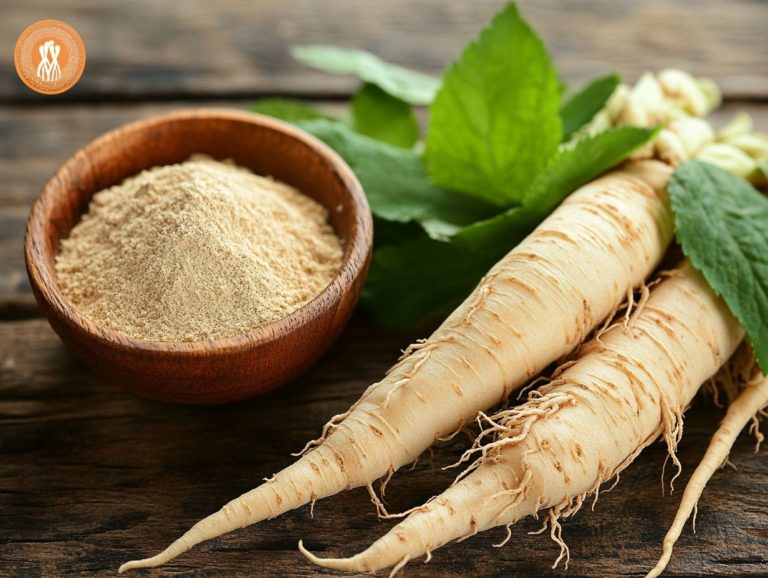5 Herbs Known for Their Antiviral Properties
In today s fast-paced world, discovering natural ways to support your immune system has never been more crucial. Many are exploring herbal remedies, drawn by their potential to fight off viral infections.
Discover how these amazing herbs work wonders for your health! This article delves into five powerful herbs garlic, echinacea, ginger, licorice root, and elderberry that have gained acclaim for their antiviral properties. You ll learn how these herbs function, any potential side effects, and practical tips on incorporating them into your diet.
We ll also touch on other natural remedies that can enhance your health. Uncover how nature can fortify your defenses against viruses!
Contents
- Key Takeaways:
- 1. Garlic
- 2. Echinacea
- 3. Ginger
- 4. Licorice Root
- 5. Elderberry
- What Are Antiviral Herbs and How Do They Work?
- Frequently Asked Questions
- What are 5 herbs known for their antiviral properties?
- How do echinacea and elderberry help fight off viruses?
- What makes garlic effective against viral infections?
- Can ginger be used to prevent viral infections?
- How does licorice root help with viral infections?
- Are there any potential side effects of using these herbs for their antiviral properties?
Key Takeaways:
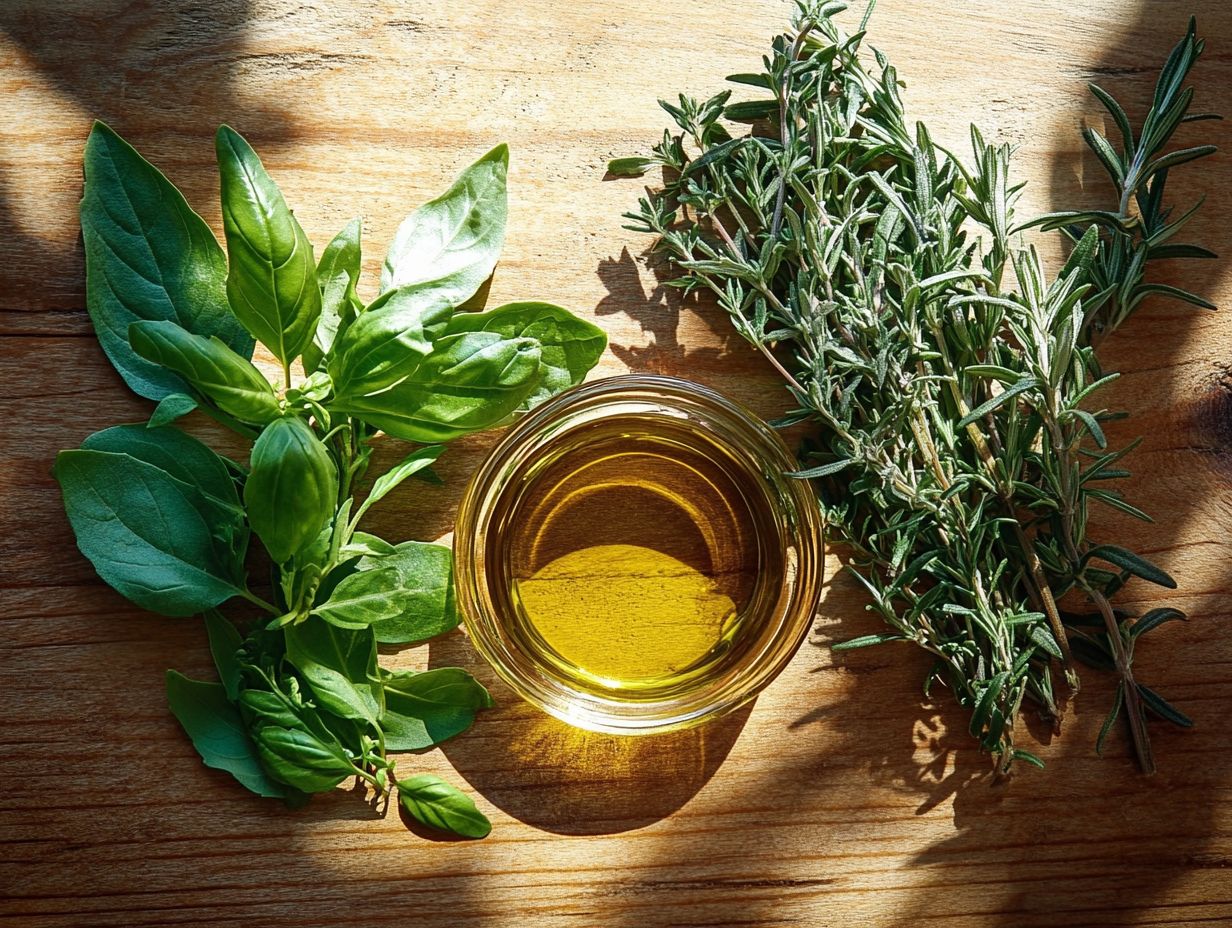
- Garlic is a powerful antiviral herb that can help boost the immune system and fight off infections.
- Echinacea has been used for centuries to treat various viral infections, and its active compounds can prevent viruses from replicating.
- Ginger has potent antiviral properties that can help alleviate symptoms of respiratory infections and improve overall immune function.
1. Garlic
Garlic has long held an important role in both traditional medicine and modern healthcare, celebrated for its remarkable antiviral properties. It s renowned for enhancing the immune system while offering a range of health benefits, particularly in providing support against viral infections like COVID-19 and the flu.
This impressive effectiveness stems from specific compounds such as allicin, diallyl sulfide, and ajoene, all of which have shown antiviral capabilities in various studies. For example, a clinical study published in the Journal of Clinical Microbiology revealed that allicin can inhibit the replication of certain viruses, effectively bolstering your body s defense mechanisms.
You can easily add garlic to your meals; saut it, toss it into soups, or blend it into dressings. If you find raw or cooked garlic a bit daunting, high-quality garlic supplements in capsule or oil form offer a convenient alternative, allowing you to easily tap into its health benefits on a regular basis.
2. Echinacea
Echinacea stands out as a celebrated herbal remedy, renowned for its remarkable antiviral properties. You ll find it widely embraced in traditional medicine as a powerful ally for strengthening your immune system and warding off ailments like colds and flu.
Among the various species such as Echinacea purpurea, Echinacea angustifolia, and Echinacea pallida each has garnered significant attention for its distinct composition and health benefits. You have the flexibility to enjoy these species in multiple forms, including teas, tinctures, and capsules, catering to your personal preferences.
These preparations can effectively combat specific viral infections, including the common cold and influenza. Scientific studies, particularly randomized controlled trials, underscore Echinacea’s potential to shorten the duration and lessen the severity of these viral invaders, making it an invaluable supplement for anyone seeking natural antiviral support.
3. Ginger
Ginger is not just a popular culinary spice; it s a powerhouse of antiviral properties that can significantly boost your immune system. If you re aiming to ward off viral infections and enhance your overall health, this remarkable root is an essential addition to your routine.
For centuries, ginger has been cherished in traditional medicine, celebrated for its ability to stimulate circulation and fortify your body s natural defenses. The active compounds, such as gingerol and shogaol, lend ginger its impressive anti-inflammatory properties, promoting a more robust immune response.
Incorporating fresh ginger into your diet is a breeze. You can easily toss it into teas, smoothies, and stir-fries or use it to elevate the flavors of soups and marinades. If you prefer a more convenient option, ginger supplements come in various forms, including capsules and powders, perfect for your busy lifestyle.
Don t miss out on this powerful ingredient! Embracing this versatile ingredient can transform your meals into delightful, health-enhancing experiences.
Explore these herbs today to supercharge your immune health!
4. Licorice Root
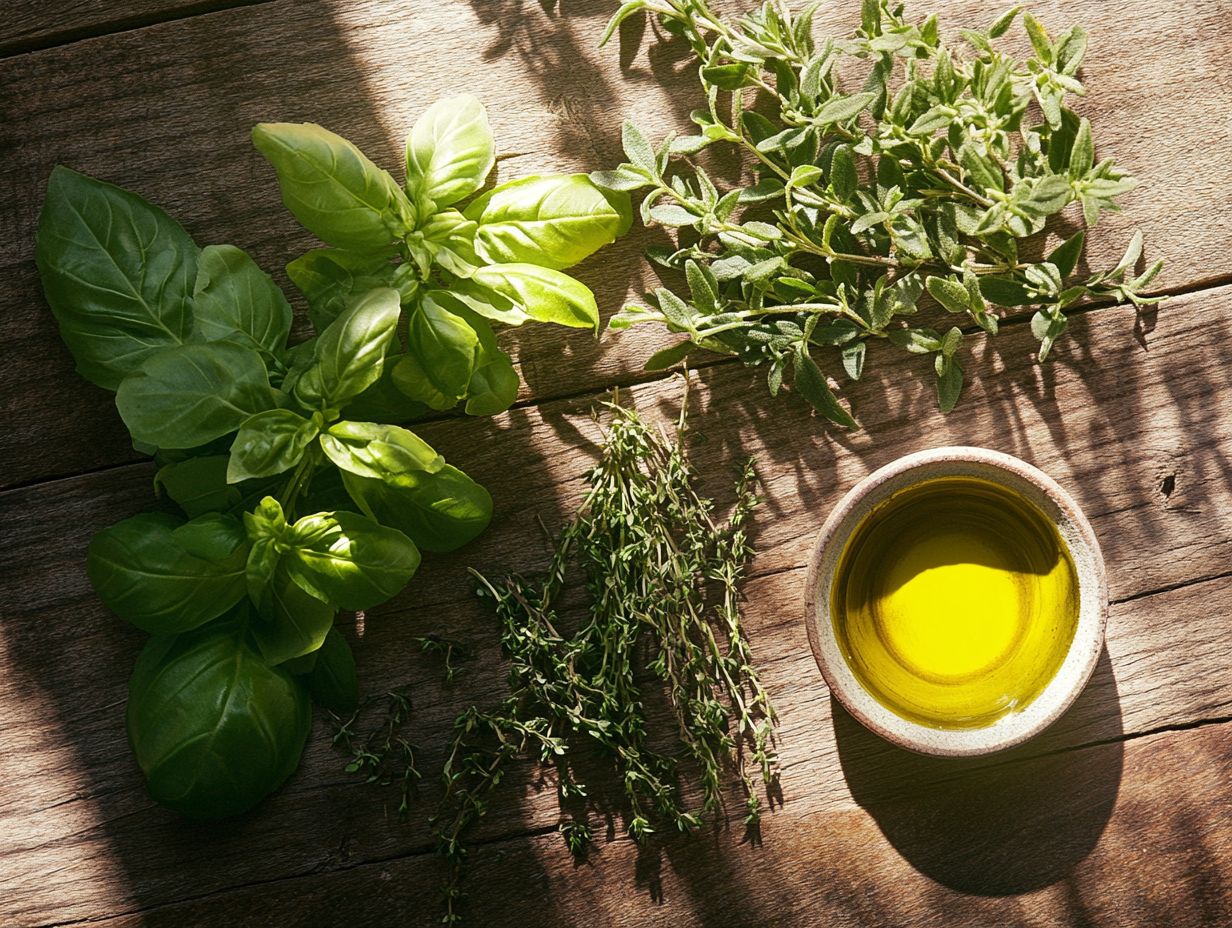
Licorice root has long been a staple in traditional medicine. It is celebrated for its antiviral properties and remarkable ability to support your immune system against various viral infections, including the herpes simplex virus and HIV.
This root is packed with active compounds like glycyrrhizin a compound that may help protect your immune system and flavonoids. These are believed to inhibit viral replication while enhancing your body s defenses.
While many individuals seek out this natural remedy without issue, it s essential to be mindful of the potential drawbacks of excessive consumption. This can lead to side effects such as hypertension, low potassium levels, and hormonal imbalances.
To seamlessly integrate licorice root into your health routine, consider:
- Sipping it as a soothing tea
- Using it in tincture form for convenience
- Blending it into your smoothies for a nutritious boost
Always consult a healthcare professional before embarking on any new supplement journey.
5. Elderberry
Black elderberry stands out for its impressive antiviral properties. It particularly bolsters your immune system against viral infections such as COVID-19 and influenza. Because of this, many people eagerly choose it for their health needs.
Research has underscored its potential to shorten the duration and lessen the severity of cold and flu symptoms. Regular consumption can significantly enhance your overall health. Its effectiveness is often linked to the high levels of antioxidants present in the berries, which help combat oxidative stress, an imbalance between free radicals and antioxidants in your body.
If you’re looking to weave this powerful fruit into your daily routine, elderberry is versatile and can be enjoyed in various forms, including:
- Syrups
- Gummies
- Capsules
- Teas
Incorporating elderberry syrup into your morning smoothie or enjoying gummies as a midday pick-me-up can be both delightful and beneficial for maintaining a strong immune system. Don t miss out on boosting your health with elderberry today!
Antiviral herbs are your go-to natural remedies, renowned for their ability to inhibit viral activity and enhance your immune system. They play a vital role in traditional medicine and modern healthcare strategies aimed at tackling viral infections, including COVID-19 and the flu.
These remarkable botanicals work their magic through various mechanisms, like disrupting viral replication, modulating immune responses, and providing anti-inflammatory benefits.
For instance, Echinacea is celebrated for its immune-boosting properties, while elderberry can shorten the duration of cold and flu symptoms. Licorice root has also gained recognition for its potential to inhibit viral replication and alleviate respiratory issues.
The resurgence in interest surrounding herbal remedies highlights a shift in healthcare perspectives. More individuals are looking for complementary therapies to enhance their well-being in the face of rising viral threats. This growing curiosity illustrates an emerging synergy between traditional wisdom and scientific research, paving the way for more integrative approaches to health.
You ll discover a rich variety of antiviral herbs, each boasting unique properties and applications in traditional medicine. Think of familiar names like garlic, ginger, Echinacea, and turmeric.
These herbs not only enhance your overall wellness but have also been the focus of studies examining their effectiveness against specific viral infections. For example, garlic is renowned for its high allicin content, which showcases antiviral properties against influenza. Meanwhile, ginger is celebrated for its anti-inflammatory effects, which may help strengthen your immune system and potentially shorten the duration of viral illnesses.
Echinacea has long been lauded for its ability to stimulate white blood cell production, thereby boosting your body s defenses against pathogens. Turmeric, with its active ingredient curcumin, is known for its antioxidant benefits that can assist in recovery from viral infections.
This blend of anecdotal and scientific evidence underscores the vital role these herbs can play in your natural health strategy.
How Do These Herbs Help in Fighting Viral Infections?
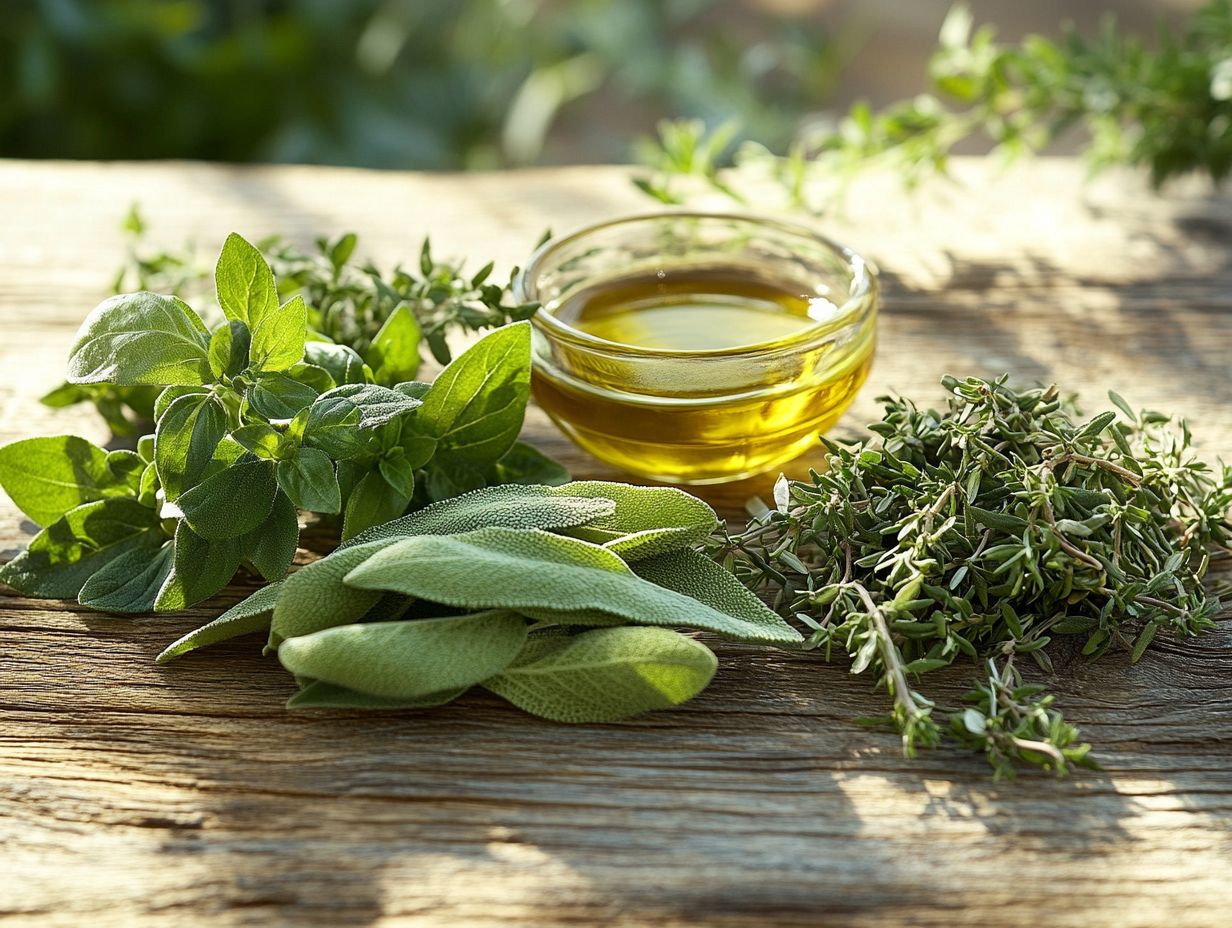
Antiviral herbs are your allies in the battle against viral infections. They enhance your immune system, reduce inflammation, and directly inhibit viral replication. This makes them invaluable supplements in your preventive health care arsenal.
Take elderberry and echinacea, for example. These remarkable herbs employ various mechanisms to fortify your body s defenses. Elderberry boasts compounds that block viruses from entering your cells and stimulate immune cell production, boosting your overall resistance. Echinacea, on the other hand, enhances phagocytosis, which is the process by which white blood cells engulf and eliminate pathogens.
Together, these herbs play a pivotal role in modulating your immune responses and helping keep your body resilient against viral threats and potential outbreaks.
While antiviral herbs present a wealth of health benefits, it s important to stay informed to maximize your health benefits! Potential side effects can vary significantly based on the specific herb and your individual health circumstances especially when used as supplements.
For example, you might experience common side effects like stomach upset, allergic reactions, or drowsiness. Some herbs may interact with prescription medications, so be cautious. If you have pre-existing conditions, remember that herbs like echinacea may not be suitable for those with autoimmune disorders.
Given these complexities, it’s prudent to consult with a healthcare provider before diving into these supplements. This step ensures a safe and effective approach tailored to your unique health needs, allowing you to enjoy the benefits without unnecessary risks.
How Can One Incorporate These Herbs into Their Diet?
Incorporating antiviral herbs into your diet can be both enjoyable and beneficial. You can explore various methods such as cooking, brewing teas, and taking supplements to harness their health-boosting properties.
By playing with flavors and textures, you can easily whip up delicious dishes that showcase these potent herbs. For example, adding garlic to your stir-fries not only elevates the taste but also taps into its antiviral prowess.
Alternatively, brewing a soothing cup of echinacea tea can provide a comforting way to enjoy its benefits, especially during those chilly seasons.
Ready to boost your health with supplements? Here s what you need to know! It’s crucial to adhere to the recommended dosages typically ranging from 300 to 500 mg of dried herbs ensuring they enhance your overall health regimen without overwhelming your system. Consult with your healthcare provider to determine the best amount for your needs.
Exploring these options will not only boost your wellness but also elevate your culinary creativity to new heights.
Are There Any Other Natural Remedies for Fighting Viral Infections?
Besides herbs, several other natural remedies can be your allies in the fight against viral infections. Consider integrating dietary supplements like zinc, vitamin C, and immune-boosting foods into your routine to elevate your overall health.
These remedies work in harmony with antiviral herbs, enhancing your immune response and providing essential nutrients that bolster your body’s defense mechanisms. For instance, zinc is vital for cell signaling and is known to limit virus replication. At the same time, vitamin C plays a key role in boosting the production of white blood cells, which are crucial for combating infections.
Incorporating foods rich in antioxidants, such as berries and leafy greens, can further reduce inflammation and protect your cells from damage caused by oxidative stress. By embracing these remedies, you not only strengthen your immune system but also adopt a holistic approach to health and wellness.
Frequently Asked Questions
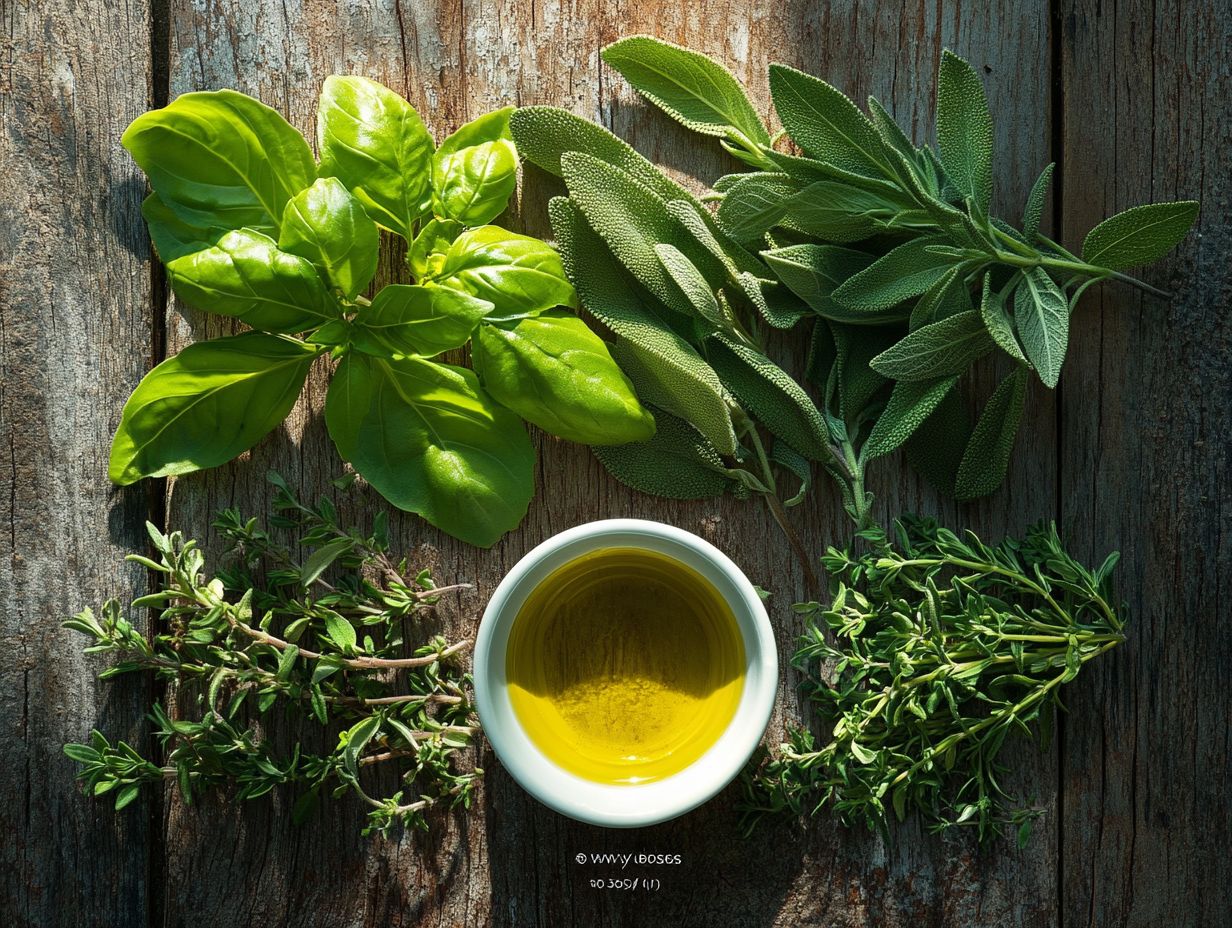
The 5 herbs known for their antiviral properties are echinacea, elderberry, garlic, ginger, and licorice root.
In summary, antiviral herbs like echinacea and elderberry, along with other natural remedies such as zinc and vitamin C, can help boost your immune system and fight viral infections. Always consult your healthcare provider before starting any new supplement regimen.
How do echinacea and elderberry help fight off viruses?
Echinacea and elderberry can boost your immune system. They help the body fight off viruses effectively.
Garlic is effective against viral infections. It has strong antiviral properties because of a compound called allicin.
Ginger can help prevent viral infections. It contains compounds known for their antiviral activity.
Licorice root aids in fighting viral infections. It contains glycyrrhizin, a natural compound that can inhibit virus replication.
These herbs are mostly safe for use. However, some people might have side effects like an upset stomach or allergic reactions. Always check with a healthcare professional before starting any herbal remedy.

